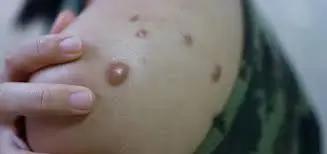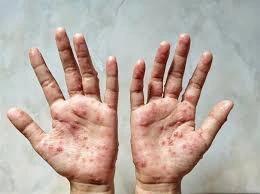
Recently, the resurgence of monkeypox, now called mpox, has sparked global concern and increased awareness about this rare viral disease. As cases continue to emerge worldwide, it has become increasingly crucial for individuals to understand the signs and symptoms associated with this infectious disease and the steps to take if they suspect they may have contracted the virus.
This article aims to equip you with the necessary knowledge to navigate the complexities of mpox, from recognising the symptoms to seeking appropriate medical care. By delving into the latest research and expert insights, we will explore the evolving nature of mpox presentations and dispel common myths, enabling you to take proactive measures to safeguard your health and that of your community.
Understanding the mpox virus
Mpox, formerly known as monkeypox, is a viral infection caused by the monkeypox virus, a member of the Orthopoxvirus genus. This virus is closely related to the virus that causes smallpox, although mpox typically results in a milder illness.
Historically, mpox has been primarily found in Central and West Africa, where it is considered endemic. However, the recent global outbreak has seen the virus spread to regions that have not previously experienced significant mpox transmission.
The monkeypox virus is divided into two distinct categories:
- Clade I, also known as the Congo Basin clade, is associated with more severe disease and a higher mortality rate
- Clade II, the West African clade, generally results in a milder illness
The current global outbreak is mainly caused by a subtype of Clade II, known as Clade IIb.
How is mpox spread?
Mpox can be spread through close, prolonged and direct contact with an infected person, their respiratory droplets, or contaminated materials. The virus can also be spread from infected animals, such as certain rodents, to humans. Individuals at higher risk of contracting mpox include those with multiple sexual partners, healthcare workers, and those with weakened immune systems, such as people living with HIV/AIDS.
Recognising the mpox rash
One of the main symptoms of mpox is the development of a characteristic rash. While the rash can appear in various forms, understanding its typical presentation can help with an early identification and prompt medical attention.
The mpox rash typically progresses through several distinct stages:
- Initial Appearance: The rash may initially resemble small, flat, red spots or bumps that can be painful or itchy
- Blistering and Pus-Filled Lesions: The spots will then develop into fluid-filled blisters or pus-filled bumps, which can be mistaken for other skin conditions like chickenpox or herpes
- Scabbing and Healing: As the lesions mature, they will dry out and form scabs, which will eventually fall off, revealing a new layer of skin
In the current global outbreak, the mpox rash has shown some atypical presentations, with some individuals developing fewer lesions than previously observed. The rash may also be localised to specific areas, such as the genital or anal regions, rather than spreading across the body.
Other mpox symptoms
In addition to the characteristic rash, individuals with mpox may experience a range of other symptoms that can provide clues for diagnosis and management.
Flu-like symptoms
Many people with mpox will experience flu-like symptoms, including fever, chills, headache, muscle aches, and fatigue, before the development of the rash.
Swollen lymph nodes
Swollen lymph nodes, particularly in the neck, armpits, or groin, are a common symptom of mpox and can help differentiate it from other skin conditions.
Respiratory symptoms
Some individuals with mpox may also experience respiratory symptoms, such as sore throat, nasal congestion, or cough, which can indicate the virus’s progression.
Seeking medical attention
If you suspect you may have been exposed to mpox or are experiencing symptoms, it is crucial to seek medical attention promptly. Early diagnosis and appropriate management can help mitigate the spread of the virus and improve patient outcomes.
When to contact a healthcare provider
If you develop a new, unexplained rash or skin lesions, especially if accompanied by other mpox symptoms, contact your healthcare provider immediately. Be prepared to provide information about any potential exposures or close contacts.
How is mpox diagnosed?
Your healthcare provider will likely begin the diagnostic process by visually examining the rash and gathering information about your symptoms and potential exposures. They may then collect a sample from the rash, which will be sent to a laboratory for testing to confirm the presence of the mpox virus.
Importance of early diagnosis
Early diagnosis is vital, as it allows for appropriate isolation measures to be implemented, reducing the risk of further transmission. Additionally, early diagnosis can provide access to potential treatments or supportive care, which may be more effective in the early stages of the illness.
Treatment options
In some instances, individuals with mpox may develop more severe illness, requiring specialised medical treatment. In these cases, healthcare providers may consider the use of antiviral medications or other interventions.
Antiviral medications
Certain antiviral drugs, such as tecovirimat and cidofovir, have been approved or are being investigated for the treatment of mpox. These medications may be prescribed for individuals at risk of developing severe disease or those with compromised immune systems.
Supportive care
For individuals with more severe mpox symptoms, hospitalisation and supportive care, such as management of respiratory distress, fluid therapy, and treatment of secondary infections, may be necessary.
Vaccination
In some cases, healthcare providers may recommend the use of vaccines, such as the JYNNEOS vaccine, for individuals who have been exposed to mpox or are at high risk of exposure. These vaccines can provide some level of protection against the virus.
Prevention
While there is no way to completely eliminate the risk of contracting mpox, there are several measures that individuals can take to reduce their risk of exposure and transmission.
Avoiding close contact
Limiting close, skin-to-skin contact with individuals who may be infected, as well as avoiding intimate contact with multiple partners, can significantly reduce the risk of mpox transmission.
Isolation and maintaining good hygiene
If you have been diagnosed with mpox, you should isolate yourself from others until all of your lesions have fully healed and a new layer of skin has formed. During this time, practice good hygiene, such as frequent handwashing, covering any skin lesions, and avoiding contact with others.
Controlling symptoms
Over-the-counter medications, such as pain relievers and fever reducers, can help alleviate the discomfort associated with mpox symptoms. Additionally, warm baths, oatmeal soaks, and gentle skin care can provide relief for the rash and associated itching.
Vaccination
For individuals at high risk of mpox exposure, vaccination may be a valuable tool in reducing the likelihood of infection and severe disease. Healthcare providers can guide the appropriate use of available vaccines.
Conclusion
By understanding the signs and symptoms, seeking medical attention quickly, and putting in place preventive measures, we can collectively work to reduce the impact of mpox.
Remember, if you suspect you may have been exposed to mpox or are experiencing symptoms, do not hesitate to reach out to your healthcare provider. Early diagnosis and treatment are key to your well-being and the prevention of further spreading of this disease.
Sources
- Signs and Symptoms – Mpox – Poxvirus – CDC
- Mpox (Monkeypox): Causes, Symptoms, Treatment & Prevention
- Mpox – WHo
- Dermatologist explains what the mpox (monkeypox) rash looks like
Medical Disclaimer
NowPatient has taken all reasonable steps to ensure that all material is factually accurate, complete, and current. However, the knowledge and experience of a qualified healthcare professional should always be sought after instead of using the information on this page. Before taking any drug, you should always speak to your doctor or another qualified healthcare provider.
The information provided here about medications is subject to change and is not meant to include all uses, precautions, warnings, directions, drug interactions, allergic reactions, or negative effects. The absence of warnings or other information for a particular medication does not imply that the medication or medication combination is appropriate for all patients or for all possible purposes.








